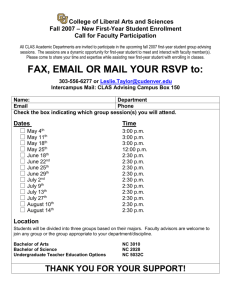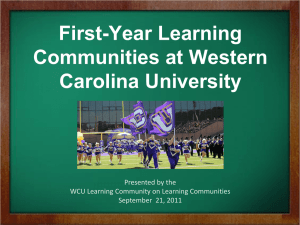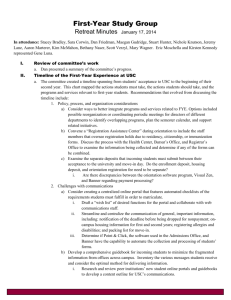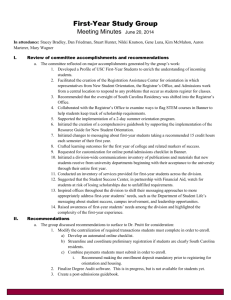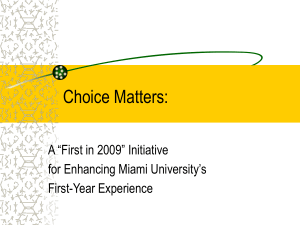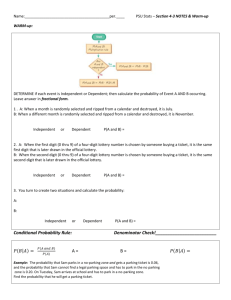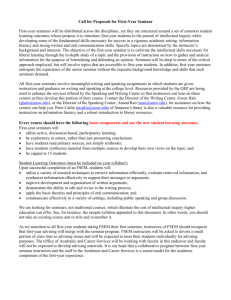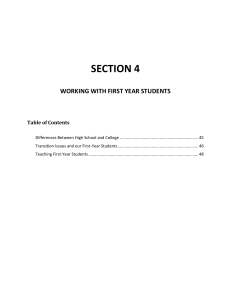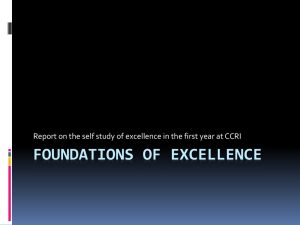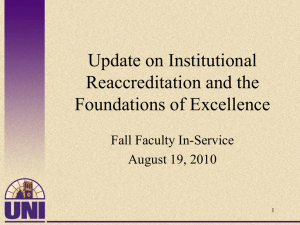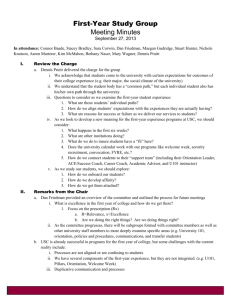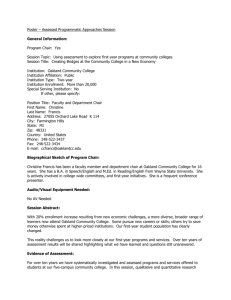BRING YOUR *A* GAME: Actions for Adapting and Assessing Your
advertisement
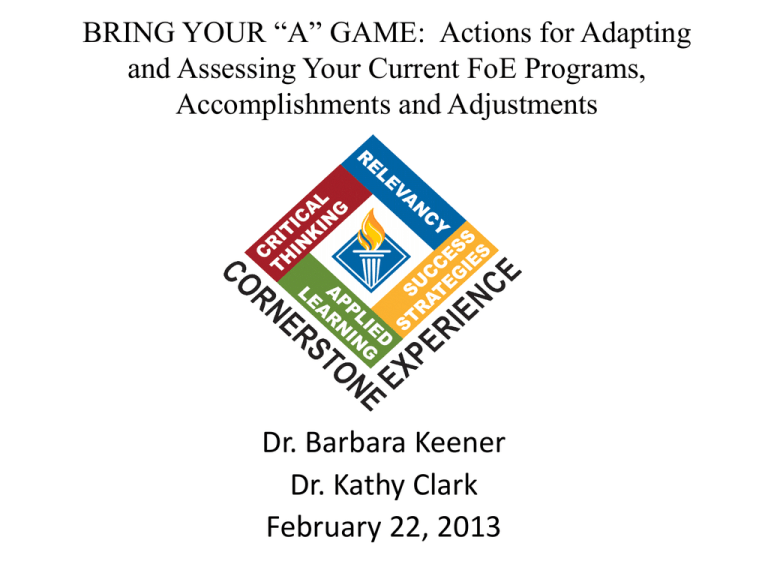
BRING YOUR “A” GAME: Actions for Adapting and Assessing Your Current FoE Programs, Accomplishments and Adjustments Dr. Barbara Keener Dr. Kathy Clark February 22, 2013 Outline of Presentation • Introduction • Background of the Program (Foundations of Excellence) • Outcomes of the Study (Implementation and Assessment) • Accomplishments and Adjustments (Lessons Learned) • Conclusion Background of the Program (Foundations of Excellence) FoE Self-Study At the conclusion of the year-long study : • College participation (148 faculty and staff) • 120 recommendations from the 9 dimension reports (Philosophy, Organization, Transition, Faculty/Campus Culture, All Students, Learning Diversity, Roles and Purpose and Improvement) A Task Force divided the approximately 120 recommendations from the FoE self-study into six categories. The following six categories provided the framework for the first-year program: Student Learning Student Support Training and Development Orientation Communication Evaluation Refer to Handouts • Goals of the course were developed • Professional Development training modules were developed for faculty and staff • Student learning outcomes and assessments were established • A course name and logo was designed • A pilot course was implemented in Spring 2012 with full implementation scheduled for Fall 2016 Outcomes of the Study (Implementation and Assessment) Stage 1 Interview Protocol Findings • To what extent did the following have on the creation, development and implementation of the First-Year Experience course? a. Financial Resources 1. No effect 2. Some effect 3. Significant effect Explain_______________ a. Financial Resources 1. No effect 2. Some effect (57.1%) 3. Significant effect (42.9%) Explain_______________ Findings (Continued) b. Human Resources 1. No effect 2. Some effect 3. Significant effect Explain_______________ b. Human Resources 1. No effect (7.2%) 2. Some effect (57.1%) 3. Significant effect(35.7%) Explain_______________ Findings (Continued) c. Curriculum 1. No effect 2. Some effect 3. Significant effect Explain______________ c. Curriculum 1. No effect 2. Some effect (28.6%) 3. Significant effect (71.4%) Explain______________ d. Organizational Leadership 1. No effect 2. Some effect 3. Significant effect Explain______________ d. Organizational Leadership 1. No effect 2. Some effect (14.3%) 3. Significant effect (85.7%) Explain______________ Findings (Continued) e. College Processes and Procedures 1. No effect 2. Some effect 3. Significant effect Explain______________ e. College Processes and Procedures 1. No effect (7.2%) 2. Some effect (21.4%) 3. Significant effect (71.4%) Explain______________ Summary of Interview Protocol Findings • Effect of College Resources on the first-year experience course, in order of importance: • • • • • Organizational Leadership Curriculum College Processes and Procedures Financial Resources Human Resources Stage 2 Focus Group Interview Findings 1. What do you consider to be the most important considerations in the creation of the First-Year Experience course? Planning and development (Committees) Support from leadership Faculty Issues (buy-in) 2. What do you consider to be the most important considerations in the development of the First-Year Experience course? Leadership Faculty Training and Development Student Population (Target market) 3. What do you consider to be the most important considerations in the implementation of the FirstYear Experience course? Communication Issues Advising and Registration Training and Development 4. If you received the opportunity to revise the entire process of creating, developing and implementing the First-Year Experience course what, if anything, would you change? Course Curriculum Training and Development Faculty Involvement Advising Administration Summary and Assessment • 1. The creation, development and implementation of a first-year experience course requires a strategic plan that involves college-wide effort. • 2. An organizational structure which supports the first-year experience course must be in place along with the support staff prior to the implementation of the course. Summary and Assessment (Continued) • 3. Professional development training modules must be created to support a first-year experience course. • 4. Standardized college processes and procedures for registering and advising the firsttime-in-college students into a required first-year experience course should be established prior to the courses’ implementation. Lessons Learned 1. Strong leadership 2. Faculty and staff buy-in 3. Provide professional development opportunities to train faculty and staff 4. College processes and procedures to implement a required three-credit hour first year experience course need to be wellplanned, specially in the areas of advising and registration. QUESTIONS? Conclusion Student Focus Group Responses • "Can't mess up your life after you take this course.” • Much needed- I would have dropped out without this classextremely helpful. • Learned how to think critically, learned not to give up. • "We laugh together-like a family.” • Because of the course, I know where to go. Learned critical thinking strategies. Learned about learning styles. • “Helps you figure yourself out.” Student Testimonials Final Essays • This semester has been one of my greatest pleasures and challenges. The course specifically challenged many of my core beliefs about who I am and my abilities. • By applying what I have learned and experienced in this course, success is the only possible outcome for me. • All in all, I must say that I think every single new student should take advantage of this course. The help that is given in this class will go a long way to help me for the rest of my life. I am actually sad that the course is coming to an end. Thank you for your participation! Dr Barbara Keener (barbara.keener@capella.edu) Dr. Kathy Clark (kclark@edison.edu)
